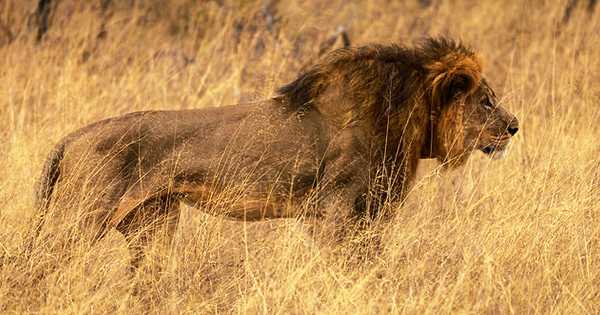The Shot Heard Around the World
Why are we eager to save some animals and not others?

The outrage that erupted this summer after a Minnesota dentist shot dead a lion in a Zimbabwe wildlife park shows how passionately people feel about the conservation of endangered species. Cecil the Lion briefly became more famous than Aslan, with his own Twitter hashtag and thousands of angry supporters on social media, some of whom even threatened violence against the dentist, forcing him to temporarily close his practice.
But why do we care? After all, as animal rights activists have pointed out, the average American eats about 30 land animals a year, most of which led far worse lives than Cecil before being slaughtered. Cows, pigs, and chickens are far from endangered species, however.
Lion populations have declined by half in the past 20 years. Although trophy hunting has contributed to this (scores of lions are killed this way every year in Zimbabwe alone), the main threats they face en route to extinction are other human impacts, such as habitat loss, conflict with farmers, and disease.
By contrast, the main threat that elephants face is hunting for their lucrative ivory tusks. Elephants are being poached at an alarming rate—more than 100,000 were killed between 2010 and 2012, and indeed, a family of five elephants was killed in the same park and in the same month as Cecil, although their deaths received little press coverage.
It’s clear that the rate at which we are exterminating species is unprecedented in human history and rare in the history of life on Earth. Scientists warn that we are heading for the planet’s sixth mass extinction event, whereby 75 percent of all current mammal species could be wiped out. Unlike the previous five, which were the result of natural events, such as a supervolcanic eruption, this will be the first mass extinction caused by a living species—us.
Does this matter? Well, we don’t exactly need lions or elephants. If they were to go extinct, it would have negligible impact on human lives. Much more worrying from a human survival perspective is, say, the decline in bee populations. If pollinators went extinct, our food supply would be catastrophically limited. Conservation projects for bees are therefore understandable.
But what’s the point of trying to save endangered species that are not useful to us and may even harm us, such as lions or polar bears? After all, doing so costs billions of dollars at a time when human beings around the world are suffering for want of financial aid.
The usual argument is that all animals provide humans with an ecosystem service. Animals and plants exist as part of a web of biological activity, which supports our lifestyles. So, for example, as top predators, lions keep in check animals further down the food chain. By removing lions, this chain is broken and, say, herbivore populations explode. The landscape would then change to reflect this, leading to perhaps more fires, or a raised incidence of lethal tick-borne diseases that spread to humans or cattle.
Ecosystems are vital for humans—they are what clean our air and water, provide our food, clothes, and medicines. And this conservation argument holds true for many species. In truth, however, conservation is important to us for an entirely different reason—a reason that better explains the passionate response to Cecil’s untimely end. Quite simply, we like certain species. Lions are beautiful, we don’t want them to go extinct in the wild, and we want the assurance that they will be protected from hunters in a wildlife park.
Irrational or not, most of us don’t want to see one shot for the purpose of decorating a dentist’s living room.

